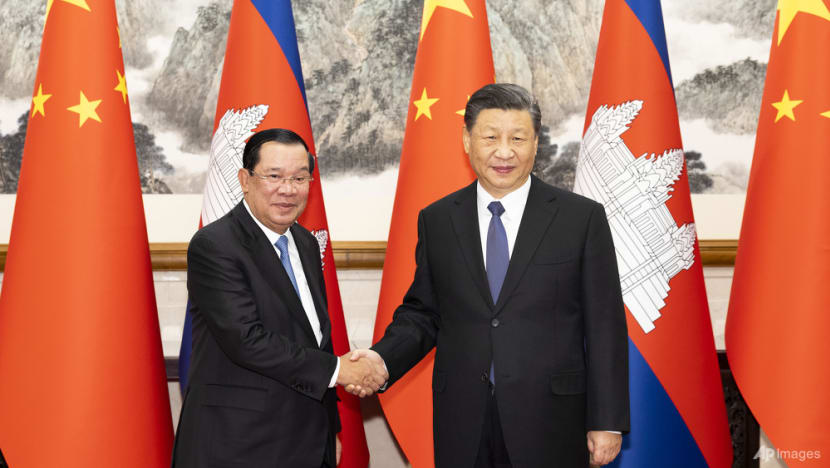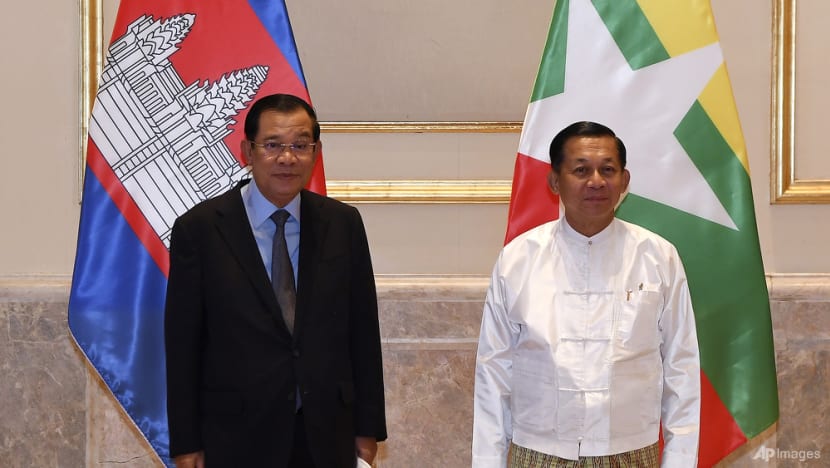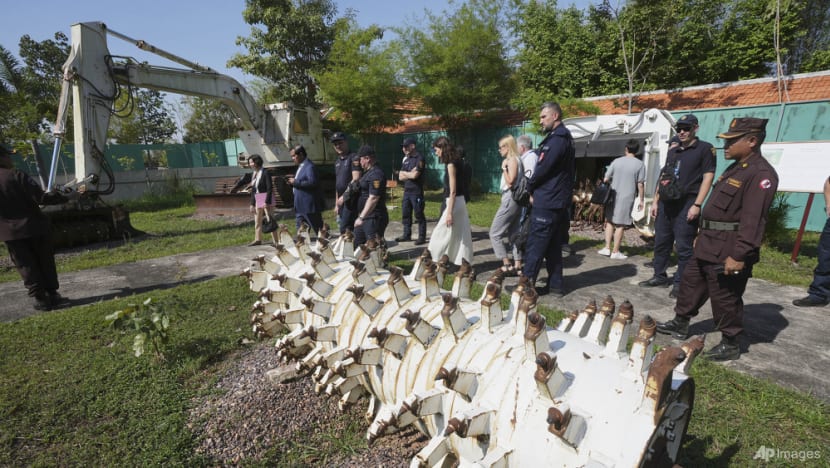Commentary: Can Cambodia’s future foreign policy diverge from China?
Cambodia has reengaged ASEAN on Myanmar and has consistently condemned Russia's invasion of Ukraine. Whether it can truly forge a foreign policy that stands apart from China will impact the next generation of Cambodian leaders, say two academics.

SINGAPORE: Cambodia has been portrayed as China’s proxy for decades because of its pro-Beijing stance and its economy’s deep dependence on its larger neighbour.
Cambodia treasures the ironclad friendship. China contributed to 44 per cent of the country’s total foreign direct investment between 1994 and 2021. China is Cambodia’s largest trading partner with two-way trade volume recording a substantial rise in 2022, despite supply chain disruptions caused by the pandemic and war in Ukraine.
Since 2012, China has surpassed Japan as Cambodia’s largest official development aid and soft loan provider.
When Cambodia took over as Chair of the Association of Southeast Asian Nations (ASEAN) in late 2021, many expected that the country would repeat the 2012 fiasco when ASEAN failed to issue a joint statement on the regional grouping’s position on the South China Sea. Cambodia bore the blame for scuttling the joint statement.
Contrary to these expectations, Cambodia was able to showcase a somewhat independent foreign policy and steered away from China’s direct influence during its 2022 ASEAN chairmanship. This is a welcome development for a country just finding its feet in international diplomacy.

APPROACH TO MYANMAR
Cambodia started its chairmanship year with Prime Minister Hun Sen’s visit to Myanmar in January 2022 to meet the junta chief Min Aung Hlaing. It was the first such visit by an ASEAN head of state since the military coup in February 2021, and many criticised Hun Sen for overstepping his role as ASEAN Chair by according legitimacy to the junta.
Many suspected that Hun Sen’s visit to Myanmar was at China’s behest: China had attempted to lobby the grouping to include the junta chief at the ASEAN-China Special Summit in November 2021.
Though an ice-breaking move, Hun Sen’s visit could not make any headway on implementing the Five-Point Consensus agreed upon by ASEAN leaders to resolve Myanmar’s political crisis.
The junta’s execution of pro-democracy activists in July 2022 became a turning point for Cambodia as ASEAN Chair. This event provided valuable lessons in balancing domestic interests, regional leadership and Chinese influence in a more calibrated manner.
Cambodia quickly corrected its approach to Myanmar, reengaged with its ASEAN counterparts, and continued disinviting the junta administration from ASEAN meetings.
CONDEMNATION OF RUSSIA’S INVASION OF UKRAINE
However, Cambodia’s independence from China was most apparent in dealing with the war against Ukraine. Surprisingly, Cambodia consistently condemned Russia’s invasion of Ukraine and voted to reaffirm Ukrainian sovereignty in United Nations General Assembly Resolutions ES-11/1 and ES-11/4 of March and October 2022 respectively.
One might have expected Cambodia to follow China’s lead in refusing to condemn Russia’s actions or remain neutral because of Prime Minister Hun Sen’s relatively cordial relationship with Moscow.
Cambodia has continued to exercise its agency to support the Ukrainian people. Cambodia is one of a few ASEAN countries that has given humanitarian aid to Ukraine by providing anti-landmine training.
Cambodia also facilitated Ukraine’s accession to the ASEAN Treaty of Amity and Cooperation. Even though it was broadly symbolic, Ukraine’s accession sent a strong signal to Moscow that ASEAN respects the sovereignty and territorial integrity, both core principles of the Treaty of Amity and Cooperation.
By doing this, Cambodia underpins its expectations for the recognition of its own sovereignty and territorial integrity, especially when it comes to border conflicts with its two stronger neighbours, Thailand and Vietnam.

POTENTIAL GAIN FOR PRIME MINISTER HUN SEN
During its chairmanship, Cambodia exercised some agency to move away from China’s direct influence, especially when it was relatively cost-free. This is a positive direction for the country’s foreign policy and a potential gain for Hun Sen’s legitimacy, power consolidation in Cambodia’s People Party and legacy.
Hun Sen is clearing the path for a power transition to his eldest son Hun Manet, where the latter has to earn the people’s trust.
According to the State of Southeast Asia 2023 Survey by the ISEAS-Yusof Ishak Institute, more than 90 per cent of Cambodians surveyed approve of their government’s response to the Russia-Ukraine war. This is the highest rating among ASEAN countries, even higher than that of Indonesia, which chaired the G20 process last year and whose President Joko Widodo conducted shuttle diplomacy to mediate between Kyiv and Moscow but only received a 51.2 per cent approval rating from Indonesian citizens.
Singapore, the only ASEAN member state that imposed clear sanctions against Russia, enjoyed a 68.3 per cent approval rating. At the other end of the spectrum, Thailand, which abstained from the UN vote to condemn Russia’s annexation, had just a 26.4 per cent approval rating.
Cambodia’s change in position towards Ukraine was arguably not a hasty decision but was done with a careful strategic calculation of exercising diplomatic independence and domestic interests. The West praised Cambodia over this surprising and bold move. The current Cambodian leadership paving the way for improved relations with the West is excellent preparation for the incoming Hun Manet cabinet.
STRENGTHENING ENGAGEMENT WITH ASEAN
Overall, Hun Sen’s attempt to reduce Cambodia’s dependence on China’s influence seems to have shown some positive results.
First, his leadership and the Cambodia’s People Party’s legitimacy have been shored up with increased popular trust in his foreign policy direction, as the ISEAS survey shows.
Second, China’s economic influence has assisted its socio-economic development in recent years. Even so, the country’s desire for development has not necessarily led to Cambodia’s over-reliance on China.
Other than China, Cambodia’s 2022 free trade agreement with South Korea and the Regional Comprehensive Economic Partnership entry into force are expected to boost foreign direct investment in the country.
Within the current geopolitical context, it is timelier than ever for Cambodia to repair its relations with Western countries and to strengthen its engagement with regional powers other than China for its future economic and security guarantees.
The next generation of Cambodia’s leadership needs domestic and international legitimacy to continue “diversifying” its foreign policy and to show that Cambodia will not put all its eggs in only China’s basket.
Melinda Martinus is the Lead Researcher in Socio-cultural Affairs at the ASEAN Studies Centre, ISEAS – Yusof Ishak Institute. Chhay Lim is a Visiting Fellow at the Center for Southeast Asian Studies, Institute for International Studies and Public Policy, of the Royal University of Phnom Penh. This commentary first appeared on the ISEAS-Yusof Ishak Institute’s blog, Fulcrum.
















